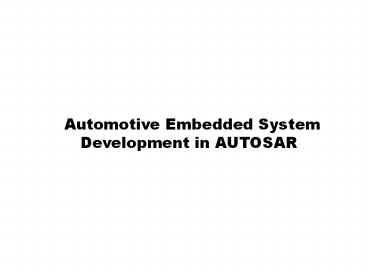Automotive Embedded System Development in AUTOSAR - PowerPoint PPT Presentation
Title:
Automotive Embedded System Development in AUTOSAR
Description:
Automotive Embedded System Development in AUTOSAR Contents What is AUTOSAR AUTOSAR from a Technical Point of View Example AUTOSAR System Automotive Embedded System ... – PowerPoint PPT presentation
Number of Views:3825
Avg rating:3.0/5.0
Title: Automotive Embedded System Development in AUTOSAR
1
Automotive Embedded System Development in AUTOSAR
2
Contents
- What is AUTOSAR
- AUTOSAR from a Technical Point of View
- Example AUTOSAR System
- Automotive Embedded System Development in AUTOSAR
3
What is AUTOSAR
- AUTOSAR (AUTomotive Open System Architecture)
- De-facto standard, jointly developed by
automobile manufacturers, suppliers and tool
developers. - More than 100 member companies
- Homepage www.autosar.org
- The idea of AUTOSAR
- Standardized and uniquely-specified interfaces
basic software modules help to master the
increasing complexity - The consequence is reusability, efficiency and
easy handling of electronic in the automobile - AUTOSAR Target and Goal
- Define open reference architecture for ECU
software - Specify a clear interface between basis software
components and application - Reusability
- Growing software quality
4
What is AUTOSAR
- AUTOSAR partnership
5
What is AUTOSAR
- AUTOSAR Project Objectives
- AUTOSAR vision is an improved complexity
management of highly integrated E/E architectures
through an increased reuse of SW modules between
OEM and suppliers.
6
What is AUTOSAR
- Benefits from AUTOSAR
7
AUTOSAR from a Technical Point of View
- AUTOSAR Layered Architecture
8
AUTOSAR from a Technical Point of View
- AUTOSAR Layered Architecture
9
AUTOSAR from a Technical Point of View
- Methodology
- Derive E/E architecture from formal descriptions
of soft- and hardware components
Functional software is described formally in
terms of software Components (SW-C). Using
Software Component Descriptions as input, the
Virtual Functional Bus validates the
interaction of all components and interfaces
before software implementation. Mapping of
Software Components to ECUs and configuration
of basic software. The AUTOSAR Methodology
supports the generation of an E/E architecture.
10
AUTOSAR from a Technical Point of View
- AUTOSAR SW-C (Software Component)
- Application is divided into SW-Cs.
- Software Components consist of
- Ports
- Interface to other SW-Cs
- Runnable Entities (or Runnables)
- Procedures which contain the actual
implementation - Triggered cyclically or on event (e.g. data
reception) - Other software components
- Composite components for hierarchical design
- Three types of SW-C
- Atomic SW-C
- Composite SW-C
- Sensor/Actuator SW-C
11
AUTOSAR from a Technical Point of View
- RTE (Runtime Environment)
- Implementation of Virtual Functional Bus
- Interface between SW-Cs and Basic Software
- All calls to basic software pass through the RTE
- Communication method Send/Receive signals,
Client/Server functionality - Triggering of runnables Cyclically or On event
12
AUTOSAR from a Technical Point of View
- MCAL (Microcontroller Abstraction Layer)
- MCAL is the lowest software layer of the Basic
Software - It contains internal drivers, which are software
modules with direct access to the microcontroller
internal peripherals and memory mapped
microcontroller external devices - Make higher software layers independent of
microcontroller
13
AUTOSAR from a Technical Point of View
- EAL (ECU Abstraction Layer)
- The EAL interfaces the drivers of the MACL
- It also contains drivers for external devices
- It offers an API for access to peripherals and
divides regardless of their location and their
connection to the microcontroller (port pins,
type of interface) - Make higher software layers independent of ECU
hardware layout
14
AUTOSAR from a Technical Point of View
- Services Layer
- Services Layer is the highest layer of the Basic
software which also applies for its relevance for
the application software - The Services layer offers
- Operating system functionality
- Vehicle network communication and management
services - Memory services (NVRAM management)
- Diagnostic services
- ECU state management
- Provide basic services for application and Basic
Software modules
15
Example AUTOSAR System Lighting System
- Software Component View
16
Example AUTOSAR System Lighting System
- Virtual Functional Bus View
17
Example AUTOSAR System Lighting System
- Mapped System
18
Example AUTOSAR System Lighting System
- Basic Software Architecture































